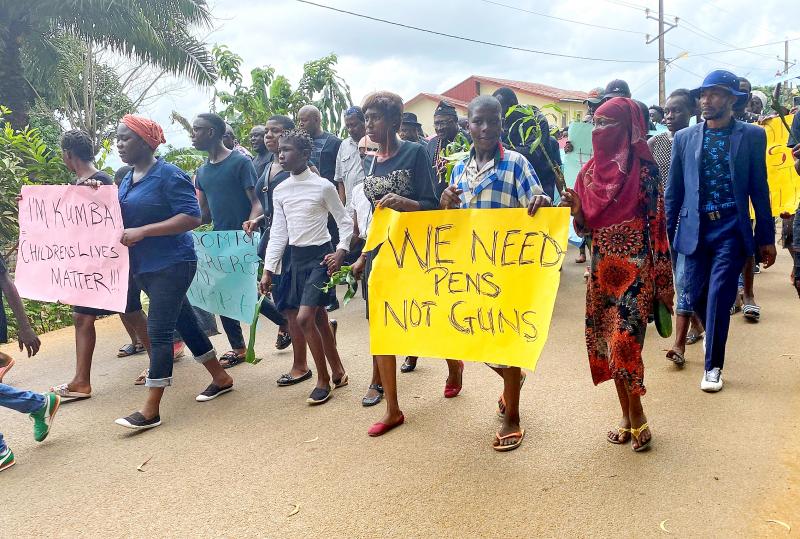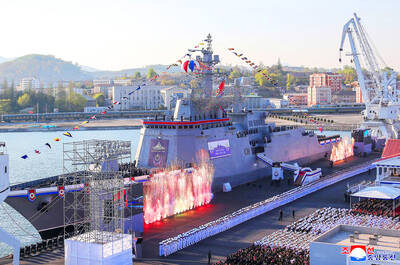Schools are “weapons of war” in a separatist insurgency in Cameroon’s two Anglophone regions, but the massacre of eight young children in class last week brought a new level of horror.
Since violence erupted in 2017, the kidnapping of youngsters, attacks on teachers and the destruction of schools have been frequent in the western part of the mainly French-speaking country.
Secessionist groups kill civilians, while the army is known for brutal attacks on non-combatants in its drive to crush forces seeking a breakaway state.

Photo: Reuters
On Saturday last week, gunmen on motorbikes rode up to a bilingual school in the town of Kumba and opened fire on girls and boys aged 12 to 14.
At least eight children perished, and about a dozen more were wounded and taken to hospital, the UN Office for the Coordination of Humanitarian Affairs said.
“The school is used as a weapon of war in this conflict,” Human Rights Watch central Africa researcher Ilaria Allegrozzi said. “The separatists don’t want the children to be in the schools, institutions which they equate with central authority.”
“Most of the teachers appointed to the Anglophone regions are Francophone,” Allegrozzi added, in a country where French is used by a majority.
The English-speaking regions are a postcolonial heritage.
Syllabuses for history and civic education lessons are seen as biased instruments of government policy by separatists, who have in recent years introduced a strategy of school boycotts.
In November last year, the UN International Children’s Emergency Fund (UNICEF) reported that about 855,000 children were not attending school in the Anglophone regions.
About 90 percent of state-run primary schools, totaling more than 4,100 establishments, and 77 percent of the state-run secondary schools were not functioning or completely closed down, UNICEF said.
The start of the new school year on Oct. 5 was markedly different.
“The government and Anglophone civil society put a lot of pressure on the separatist groups to let their children go back to school, and schools that had been closed for years began to reopen,” International Crisis Group senior researcher Arrey Elvis Ntui said.
“After three years of almost total school shortages, people began to believe again in the institution. The classrooms were packed,” said Jacques Ebwea, a political analyst based in Buea, the main town of the Anglophone Southwest region.
“It was a success. Unfortunately, Saturday’s attack will dampen the enthusiasm of many people,” he added.
On Tuesday morning, false rumors of new attacks spread panic at schools in Limbe and Buea in the Southwest region, where frightened pupils tried to flee the premises while their scared parents were rushing to fetch them.
“I don’t know if I’m going to send my child back to school,” said Desire, a resident of Kumba. “If the situation deteriorates any further, I will send him elsewhere, to Douala or Bafoussam.”
Both towns are on Francophone territory and Douala, a big city and port, is the economic capital of the country.
“There is general panic in the area,” said Semma Valentine, a teacher in Bamenda, the capital of the Northwest region. “All parties concerned are to blame.”

TRUMP EFFECT: The win capped one of the most dramatic turnarounds in Canadian political history after the Conservatives had led the Liberals by more than 20 points Canadian Prime Minister Mark Carney yesterday pledged to win US President Donald Trump’s trade war after winning Canada’s election and leading his Liberal Party to another term in power. Following a campaign dominated by Trump’s tariffs and annexation threats, Carney promised to chart “a new path forward” in a world “fundamentally changed” by a US that is newly hostile to free trade. “We are over the shock of the American betrayal, but we should never forget the lessons,” said Carney, who led the central banks of Canada and the UK before entering politics earlier this year. “We will win this trade war and

Kehinde Sanni spends his days smoothing out dents and repainting scratched bumpers in a modest autobody shop in Lagos. He has never left Nigeria, yet he speaks glowingly of Burkina Faso military leader Ibrahim Traore. “Nigeria needs someone like Ibrahim Traore of Burkina Faso. He is doing well for his country,” Sanni said. His admiration is shaped by a steady stream of viral videos, memes and social media posts — many misleading or outright false — portraying Traore as a fearless reformer who defied Western powers and reclaimed his country’s dignity. The Burkinabe strongman swept into power following a coup in September 2022

‘BODIES EVERYWHERE’: The incident occurred at a Filipino festival celebrating an anti-colonial leader, with the driver described as a ‘lone suspect’ known to police Canadian police arrested a man on Saturday after a car plowed into a street party in the western Canadian city of Vancouver, killing a number of people. Authorities said the incident happened shortly after 8pm in Vancouver’s Sunset on Fraser neighborhood as members of the Filipino community gathered to celebrate Lapu Lapu Day. The festival, which commemorates a Filipino anti-colonial leader from the 16th century, falls this year on the weekend before Canada’s election. A 30-year-old local man was arrested at the scene, Vancouver police wrote on X. The driver was a “lone suspect” known to police, a police spokesperson told journalists at the

North Korean leader Kim Jong-un has unveiled a new naval destroyer, claiming it as a significant advancement toward his goal of expanding the operational range and preemptive strike capabilities of his nuclear-armed military, state media said yesterday. North Korea’s state-run Korean Central News Agency (KCNA) said Kim attended the launching ceremony for the 5,000-tonne warship on Friday at the western port of Nampo. Kim framed the arms buildup as a response to perceived threats from the US and its allies in Asia, who have been expanding joint military exercises amid rising tensions over the North’s nuclear program. He added that the acquisition